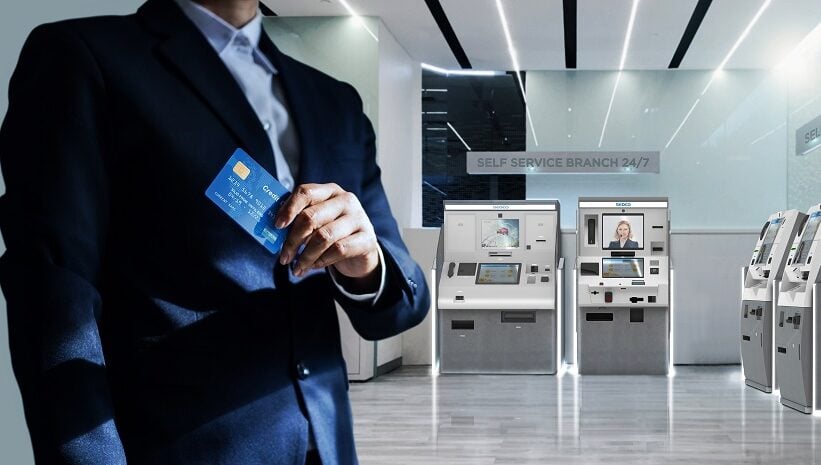Can single machines, in this case, kiosks, replace a bank branch or telco? Not yet. Can it save valuable time and money? Absolutely.
SEDCO, a prominent global provider of digital branch transformation solutions, the latest being the CONSULTA®130 kiosk, recently announced it has one that can onboard customers, scan and record any type of required KYC data, and then instantly print and issue not only debit, credit, or pre-paid cards, but also driving licenses, and loyalty cards.
Economy Middle East sought some explanation from Majdi AL-Beit Shawish, CEO at SEDCO. We asked:

What is the role of these kiosks for banks, hospitals, or telcos?
The pandemic accelerated digital transformation but many services like cheque deposits or card renewal, still required physical interaction. This is where self-service kiosks come in.
Self-service kiosks enable these banks and institutions to create a 24/7 digital corner in their traditional branch, minimizing space, reducing branch staff, and extending the working hours of the branch.
For example, if you want to renew a card, usually you have to wait for 2-3 days. With kiosks, customers receive their card immediately with the printed statement, hence cutting courier costs. In the telco market, there was more demand because customers want to receive/renew their SIM cards immediately. When branches were closed during the pandemic, self-service kiosks proved highly useful.
In the GCC, demand for digital branch transformation of government services increased greatly. For instance, the UAE Digital Government Strategy 2025 aims for the government to become digital by design.

Does the kiosk check for credit, criminal or financial fraud?
If there is a bureau in the country that has these credit ratings, we can integrate with that. For example, the ID cards in several Gulf countries have biometric identification embedded into the ID. We can validate that immediately by integrating with the backend system of the Ministry of Interior. We have an AI engine that compares your photo ID with the camera in the kiosk, in real time, and if a non-match is suspected, then a call goes to a remote agent to verify this immediately.
Regarding fraud, it depends on the countries and the APIs available. We integrate with the banks/telcos’ backend systems. Our kiosks can immediately identify the person, allowing us to deny his/her request, identify the fraud, etc.
Which aspects of a bank are you replacing?
For customers, the services are delivered promptly 24/7, replacing long waiting hours.
Businesses will need fewer branches. The staff is better utilized and managed, and they can analyze real-time data collected from kiosks to redesign the customer flow.
Kiosks will also increase revenue. Once you have this platform of service delivery 24/7, you can innovate with third-party services. Telcos and banks have the opportunity to add more revenue through value-added services, where the customers will enjoy a one-stop-shop, which will bring institutions additional transaction revenues.
Certain activities, like signing documents or cheque deposits, which cannot be accomplished via digital channels, are possible with kiosks.
What we cannot replace are some of the legal formalities. Legal systems have not coped with the high pace of digital transformation. Sometimes customers have to sign a document, for example, which isn’t possible without a witness, so the industry will take a few years to catch up.

What ROIs are expected from self-service kiosks?
One of our telco operators received its ROI in three weeks. It differs from location to location and market to market. There are several variable factors involved, like the cost of real estate, employment, and the organization’s operations itself. Usually, ROI can be expected within a maximum of around 14 months.
The technology also enhances the customer experience while cutting costs. For example, if a bank has 100,000 customer renewals for credit cards annually, and each card costs $4-5 to courier, that’s $500,000. These kiosks cut down the cost significantly.
Kiosk bank services can be used 24/7. When integrating third-party services with kiosks, companies can create a consistent revenue stream as well, as they can bundle or package their services with other services that offer value, while making a commission on the same.
How much do these kiosks cost to install, maintain, and service?
It is a fraction of the cost of a human teller. It depends upon the configuration. It could range from a simple kiosk of $2000 to a very complex kiosk that can provide a ‘bank-in-a-box’ from $25,000, plus around 8-10% of this annually for maintenance.
What is your role with fintech?
A lot of banks and tech operators are shifting to fintech and providing third-party services like a service aggregator or a brokerage. They can consult with us on the best plan for their requirements.
How did SEDCO navigate through the pandemic?
We grew by 15% in the past three years because of the huge demand for self-service, especially in telco. I see more implementation of smart kiosks in banks as well. Through our smart queuing management module, we route customers towards the digital corner based on the transaction requested, integrate with a digital signage system, provide customer feedback via a mobile app for a personalized journey that collects data across all touchpoints and integrates it into a data mining system, with business insights for planning and reporting.








